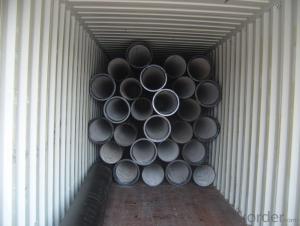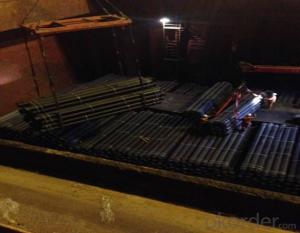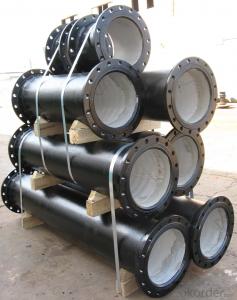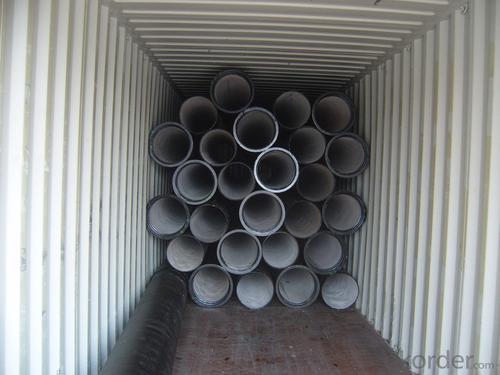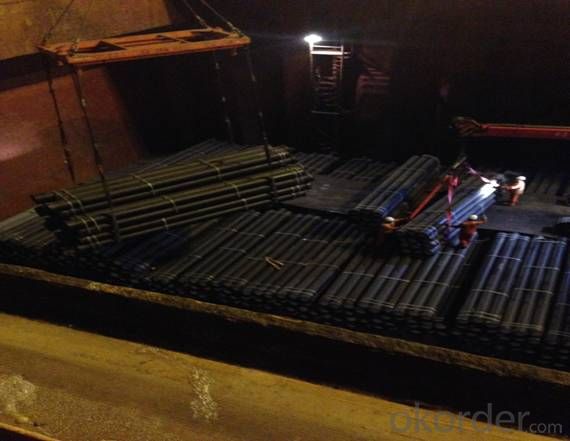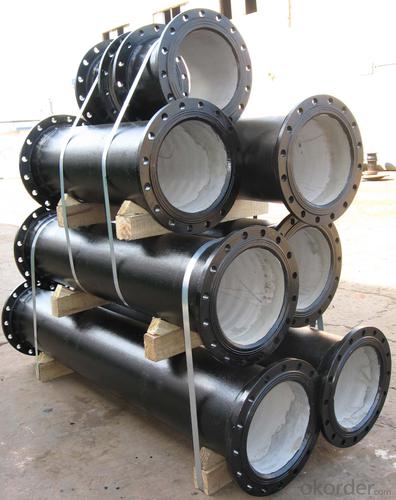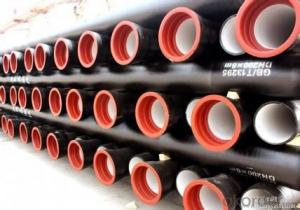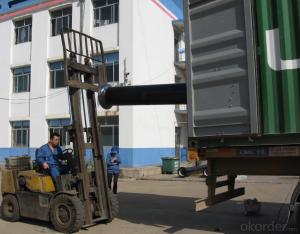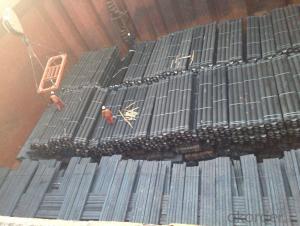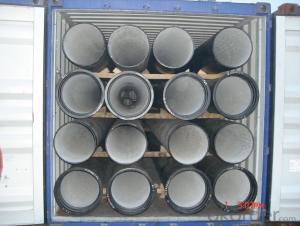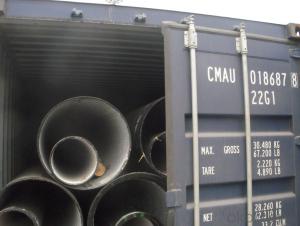DUCTILE IRON PIPES K8 DN200
- Loading Port:
- China Main Port
- Payment Terms:
- TT or LC
- Min Order Qty:
- 1 pc
- Supply Capability:
- -
OKorder Service Pledge
OKorder Financial Service
You Might Also Like
Ductile Iron Cast Pipe is without any defects compare with tradition casting tech, which has many advantages particularly as follow:
(1) High density. In the "vertical upward casting" process, the melt iron of centre liquid column in center crystallizer is continuously feeding for volume shrinkage caused by condensation tube at outer circumference , which lead to be free of shrinkage porosity.
(2) High purity. When melt iron pouring, the mixed impurities such as gas, dross, sand grain which are lighter than melt iron could be eliminated at furnace mouth, its impossible to enter into the crystallizer through the channel, so the melt iron into the crystallizer is very pure.
(3) Strength with toughness. The cooling speed provided by continuous crystallizer is 30 times than sand casting and 5 times than centrifugal casting, and doesn't produce white iron, the eutectic cell volume of continuous cast iron is one eighth to one tenth compare with traditional cast iron. The density of graphite nodule in ductile iron can reach 300-700 pcs/mm2. Therefore, all reason above improve the strength and toughness of continuous cast iron.
(4) Free machining. The high speed cooling make the hardening phase (such as boride, steadite) not appear like reticular, massive or thick, but diffuse like fish bone and pane in shape, moreover, there are tiny graphite flakes inlaid hardening phase. It's free machining in BrinellHardness the range of 250-300HB. However, the Brinell Hardness of 250 is top limit to common metal materials.
(5) High productivity. To the wall thickness of tube under 10mm, the speed of continuous casting is 1 meter/min, to the wall thickness of tube under 20mm, the speed of continuous casting is 0.5 meter/min, which is high efficiency that centrifugal or other casting tech couldn't reach.
- Q: Do ductile iron pipes require internal lining for potable water applications?
- Yes, ductile iron pipes do require internal lining for potable water applications. This is because the iron used in these pipes can react with the water and potentially contaminate it. Internal lining acts as a barrier between the water and the iron, preventing any chemical reactions and ensuring the water remains safe for consumption.
- Q: What is the relationship between the installation direction of the ductile iron pipe and the direction of flow?
- Suppose the water flows from east to west, then the pipe mouth is in the East socket at the West
- Q: Can ductile iron pipes be used for water main extensions?
- Water main extensions can utilize ductile iron pipes. These pipes are recognized for their robustness and longevity, making them a fitting option for extending water mains. They possess the capability of withstanding high pressure and resisting corrosion, essential for guaranteeing the durability and dependability of the water distribution system. Moreover, ductile iron pipes have a sleek interior surface, minimizing friction and enhancing the efficiency of water flow. In general, due to their favorable mechanical properties and capacity to withstand the demands of water distribution systems, ductile iron pipes are commonly employed in water infrastructure projects, including water main extensions.
- Q: What are the common pressure ratings for ductile iron pipes?
- Common pressure ratings for ductile iron pipes vary depending on the specific application and industry standards. However, the most commonly used pressure ratings for ductile iron pipes are Class 150, Class 200, Class 250, and Class 350. Class 150 ductile iron pipes are typically used for low-pressure applications, with a working pressure of up to 150 psi (pounds per square inch). These pipes are commonly used for water distribution systems, irrigation, and gravity flow sewer systems. Class 200 ductile iron pipes have a higher working pressure of up to 200 psi. These pipes are often used for applications that require a slightly higher pressure, such as industrial water supply, fire protection systems, and wastewater treatment plants. Class 250 ductile iron pipes have a working pressure of up to 250 psi. These pipes are suitable for more demanding applications, such as high-pressure water supply systems, power plants, and municipal water distribution networks. Class 350 ductile iron pipes have the highest working pressure rating, with a maximum pressure of up to 350 psi. These pipes are typically used for heavy-duty applications, such as industrial water supply, oil and gas pipelines, and large-scale water transportation projects. It's important to note that these pressure ratings are general guidelines and may vary depending on the specific manufacturer and product specifications. Consulting industry standards and guidelines, as well as working with qualified engineers and professionals, is essential to ensure the correct pressure rating is selected for a particular ductile iron pipe application.
- Q: What are the typical lengths of ductile iron pipes?
- The typical lengths of ductile iron pipes can vary depending on the specific project requirements and industry standards. However, commonly used lengths for ductile iron pipes range from 18 feet (5.5 meters) to 20 feet (6 meters). These lengths are suitable for various applications such as water distribution, wastewater systems, and industrial pipelines. It is important to note that custom lengths can also be manufactured to meet specific project needs.
- Q: Can ductile iron pipe be used for hydropower systems?
- Ductile iron pipe is perfectly suitable for hydropower systems. It is renowned for its robustness, longevity, and ability to resist corrosion, making it an excellent option for numerous applications, including hydropower systems. The remarkable tensile strength of ductile iron enables it to endure the immense pressure and heavy loads associated with such systems. Additionally, its resistance to corrosion makes it ideal for use in water environments, ensuring a lengthy lifespan and minimal maintenance requirements. Consequently, ductile iron pipe can effectively serve hydropower systems by offering a dependable and efficient solution for water transportation and infrastructure support.
- Q: Can ductile iron pipes be used for water treatment plants?
- Yes, ductile iron pipes can be used for water treatment plants. Ductile iron pipes have excellent corrosion resistance and durability, making them suitable for transporting water in water treatment plants. Additionally, their high tensile strength allows them to withstand the high pressures often found in these facilities.
- Q: Is the ambient temperature at minus 20 degrees better with grey cast iron or ductile iron?
- Heavy thermal and mechanical shock, high temperature or low temperature, corrosion resistance and dimensional stability. To meet these changes in use conditions, ductile iron is available in many grades, providing a wide range of mechanical and physical properties.
- Q: Classification of cast iron pipes
- Sand casting centrifugal cast iron pipe:The sand casting centrifugal cast iron pipe is made of gray cast iron. It is suitable for the transportation of pressure water such as water and gas.
- Q: Can ductile iron pipes be used for irrigation pivot systems?
- Indeed, irrigation pivot systems can utilize ductile iron pipes. Renowned for their robustness, longevity, and resistance to corrosion, ductile iron pipes are apt for numerous purposes, including irrigation. These pipes have the capability to withstand substantial water pressure, guaranteeing a dependable and enduring means of transporting water to irrigation pivot systems. Moreover, ductile iron pipes harmonize seamlessly with a variety of fittings and connectors commonly employed in irrigation systems, thereby facilitating effortless installation and upkeep. All in all, employing ductile iron pipes in irrigation pivot systems emerges as a pragmatic decision that ensures efficacious water distribution while minimizing the likelihood of pipe failure.
Send your message to us
DUCTILE IRON PIPES K8 DN200
- Loading Port:
- China Main Port
- Payment Terms:
- TT or LC
- Min Order Qty:
- 1 pc
- Supply Capability:
- -
OKorder Service Pledge
OKorder Financial Service
Similar products
Hot products
Hot Searches
Related keywords
